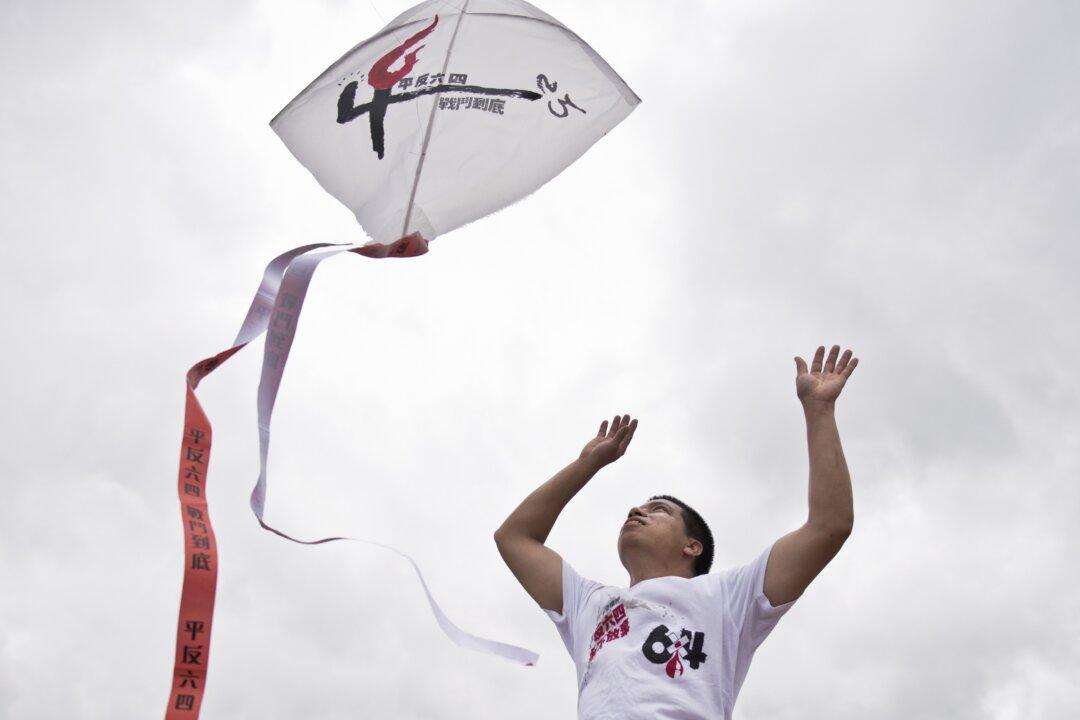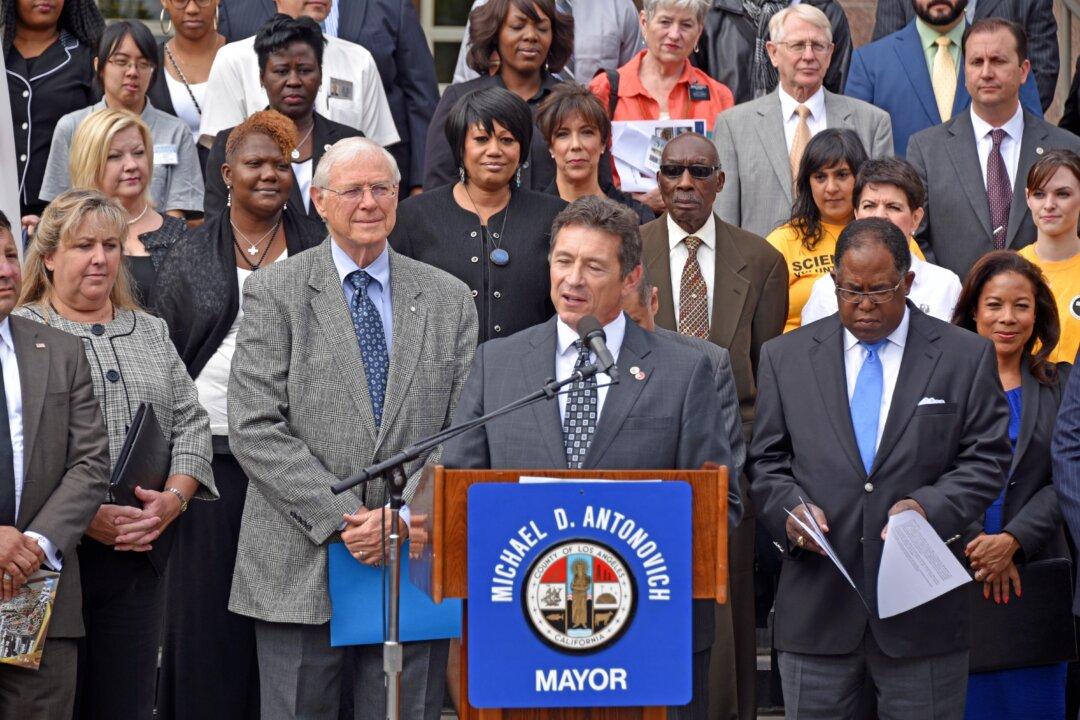Over 140 people packed into the Almansor Court Banquet Center in Alhambra, Calif., to commemorate the 1989 Tiananmen Massacre and to celebrate the Fall of the Berlin Wall that same year. Simultaneously, the Visual Artists Guild’s Art and Democracy V is exhibiting human rights art at the Bergamot Station Arts Center (suite F2) in Santa Barbara.
Ann Lau, chair of the Visual Artists Guild, welcomed the audience at the banquet center and announced who would be speaking at the event.
Unlike prior commemorations that focused on single events or activists, this year’s activity, held May 25, brought together representatives from countries that had been deprived of freedom by communism. This year the countries included China, Poland, and East Germany.
In the spring of 1989, Beijing erupted with the largest spontaneous demonstrations the Peoples’ Republic of China had witnessed in its 40-year history. The pro-democracy movement quickly spread to over 30 cities around China before the world witnessed the horrors of the regime’s brutal crackdown in Tiananmen Square. As the Chinese people fled from the tanks and guns, they asked the international press to let the world know the truth. They asked the world not to forget.
On the other side of the world, the iron curtain divided Europe for more than 40 years and “the Berlin Wall” surrounded East Berlin for more than 28 years. In 1989, Poland, Hungary, East Germany, Czechoslovakia, and Romania all collapsed under their own repressive weight. The fall of the Berlin Wall became the symbol of the Miracle Year of 1989.
Hans Eberhard, president of the German-American Tri-centennial Foundation, discussed the history of the take-over of East Berlin and its effects. During a personal interview he said, “You don’t know what it is like. In one day [Aug. 13, 1961], I could no longer visit any of my family members on the other side of the wall … for almost 30 years!”
West Berlin had at that time 2.2 million people, while East Berlin held 1.1 million people captive.
The Struggle for Democracy
Dr. Xu Wenli was honored with the Champion of Freedom of Speech Award at the ceremony. He was involved in both the 1979 Democracy Wall that became the inspiration for the 1989 Pro-Democracy movement. Twice imprisoned by the Beijing authorieis, Dr. Xu was sentenced to a total of 28 years, of which he served 16. Through the efforts of the United States, Xu was released early both times. Nancy Pelosi has called him the “Conscience of China.”
Dr. Xu discussed the unprecedented large parade during 1979. He said, “Many of you may not believe on October 1, 1979, the CCP allowed this large parade. But this was the situation. At that time the Chinese Communist Party, because the Chinese economy was on the brink of collapse, allowed such a large parade.”
Dr. Wenli lamented the long prison sentences the CCP inflicted on them. “It now has been 25 years since the 1989 June massacre, yet the Chinese Communist Party shows no signs of change,” said Dr. Wenli. The CCP imprisoned numerous democratic leaders; most are still in prison 25 years later.
Hypocrisy of Xi Jinping
Dr. Wenli has little faith in Xi Jinping. “Xi Jinping recently said in the meeting in Shanghai that what he likes most are the two sentences of Chinese philosophy called ‘He Qi,’ meaning harmony.”
“Take a look everyone; is he being harmonious to the Chinese people? Is he being harmonious to Christians? Is he being friendly to Falun Gong practitioners?” asked Dr. Wenli
Wenli goes further in his condemnation of the CCP’s leaders. “The communist leaders have extensive power yet they pocket large sums of money [illegally]. They are only friendly to the Russians occupying Chinese territory. They are not friendly to the United States or their [China’s] own neighbors,” said Dr. Wenli, “They present a peaceful demeanor but they actually have an evil character.”
“China will eventually become a country of freedom with a democratic constitution,” said Dr. Wenli.
Spirit of Tiananmen Awards
A Spirit of Tiananmen Award was given to Ross Altman, a folksinger and activist, who recounted the days of the Free Speech Movement at University of California, Berkeley, in the sixties. He sang some of his songs of stories from the movement, and told of Jack Weinberg, a student leader of the Free Speech Movement, who clashed with the university authorities in their attempt to silence the movement during the Vietnam War because it was not consistent with the U.S. position on communism. UC Berkeley then became a hotbed for the movement.
Chen Weiming, a Tibetan activist, was also awarded a Spirit of Tiananmen Award. He introduced himself: “Freedom has no boundary. I am an artist. An artist requires freedom in order to create better artistic products.”
China has blocked any form of freedom or democracy in surrounding countries. “There is no freedom or democracy in China, there is no freedom or democracy in Tibet. The same thing is happening in the state of Syria, people over there have no freedom and many people have been killed,” said Chen.
“This is one of the reasons I’m getting this award is because I worked with my Syrian friends over there, working with them together,” said Weiming.
The Spirit of Tiananmen in Iran
Esha Momeni, Iranian student activist, presented an award honoring those participants in China’s 1989 protests whose identities remain unknown. Ms. Momeni was arrested for her involvement in Iran’s protests in 2009.
In 2009 the results of the Iranian presidential election was highly contested. The Iranian people took to the streets to express their complaint and demanded an independent audit of the vote, which was seen as shameful by the Iranian people. Ms. Momeni, a student activist, shared her people’s experience and the effect of the Tiananmen spirit.
“In Iran, the spirit of Tiananmen has extended itself beyond time and geography and has touched the human collective spirit,” said Momeni.
“After the Iranian presidential election in 2009, waves of protests started that continued for over a year. During that time we Iranians couldn’t express ourselves in public. We would get arrested if we did. We could only whisper in our heads, we couldn’t talk about our martyrs, we could only think about them, we couldn’t say out loud, ‘Hey we’re here, we’re not scared, we’re standing firm, we’re countless, we’re together and we will not stop resisting the oppression until your fall.’”
Eventually, the students decided to use the Internet to fan the flames of freedom and hope by posting photos of the 1989 Tiananmen experience.
They had no voice or creditability in Iran. “There was no space for our words. Instead, we let the tank man speak for us in that moment of our fight. We posted the story of Tiananmen resistance and the students and the photos of the tank man on our Face book pages. We would email them to each other, to our email list, we talked about it,” said Momeni.
“The students of Tiananmen Square came and stood by us and spoke for us and protected us. The students of Tiananmen Square are part of the history of Iranians fight for freedom,” said Ms. Momeni. “And today as a student and as an activist, I’m deeply honored to present this award to all the nameless students of the 1989 pro-democracy movement in China.”




